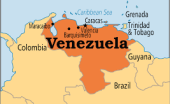Re The UN General Assembly Speaker Schedule is Here! I note that whoever will be speaking for Canada this year…
Canada's changing climate
Written by Diana Thebaud Nicholson // March 7, 2008 // Agriculture & Food, Canada, Climate Change, Environment & Energy // 1 Comment
March 07, 2008
Bad as it is today, the future looks worse in environmental study
Charles Mandel, Canwest News Service
In a major forthcoming report on Canada’s changing climate, scientists warn of everything from increased severe storm activity in Atlantic Canada to hotter summers and poorer air quality in urban Ontario.
British Columbia may face retreating glaciers and snow loss on its mountains, causing potential water shortages. The Prairie provinces will continue to struggle with drought, impacting agriculture rurally and potentially causing water rationing in urban areas.
The 500-page report is the work of 145 leading Canadian scientists. They’ve examined the current and future risks climate change presents coast to coast and what they have to say isn’t comforting.
But it’s not necessary to wait for the future to experience intense storms. A taste of that can be had this weekend as yet another major system moves in from the Gulf of Mexico.
This one will dump up to 50 centimetres of snow over Ontario and Quebec and bring winds of up to 70 kilometres an hour, as it churns over Central Canada through Saturday and into Sunday. The same system will drop 40 to 70 millimetres of precipitation along the Nova Scotia side of the Bay of Fundy and send rain and freezing rain into New Brunswick.
And, yes, as travellers head to the airports for March break, it’s very likely some flights will be cancelled and traffic will be snarled once again.
Perhaps one of the people least surprised by the wicked weekend weather, is Norm Catto, a geographer at Memorial University in Newfoundland and one of the climate report’s lead authors.
On Friday, he said the intensity of weather events is increasing.
When hurricane Juan swept through Atlantic Canada in 2003 the storm surge didn’t coincide with high tide. But next time it could and the level of the water could be 40 to 50 centimetres higher.
Quentin Chiotti, a senior scientist with Pollution Probe in Toronto and another study author, echoed Catto’s concern. In Ontario, for example, intense dumps of precipitation could lead to floods of the sort Toronto and Peterborough endured in 2005.
Chiotti said such floods illustrated that much of the region’s critical infrastructure was based on standards developed following hurricane Hazel in 1954 and is in need of updating.
Like many of the scientists, Chiotti warned that the weather will become increasingly unpredictable. “When you put more heat into the atmosphere, you’re going to start getting more wacky weather, and that’s going to be more variable from season to season and year to year.”
Catto said Northern Canada faces permafrost erosion, retreating coastlines and problems with maintaining the ice roads that provide vital transportation links in winter.
On the Prairies, drought could potentially affect the power supply. Problems with water reservoirs could leave utilities without sufficiently high levels of water to generate the amount of power required
People in Ontario and much of Quebec know all about “extremes” as they cope with the sixth major snow storm of the season Saturday, expected to dump between 30 and 50 centimetres of snow on parts of each province.
As much as 30 cm of snow was expected in Toronto, up to 40 cm in Ottawa and maybe even more -mixed with ice pellets -was anticipated to cover the streets of Montreal.
Environment Canada says usually at this time of the year, temperatures begin to rise to an average in the 1 C to 4 C range in Ontario, but the forecast for mid-March likely would be filled with temperatures in the -3 C range for many parts of the region.
Montreal was drifting depressingly close to matching or even breaking the record of 383 centimetres of snowfall set in 1971.




One Comment on "Canada's changing climate"
Related article
20 February 2008
Canada: Adapting To A Changing Climate: Risk Management And Due Diligence In The Age Of Climate Change
Selina Lee-Andersen,
© 2008, Blake, Cassels & Graydon LLP